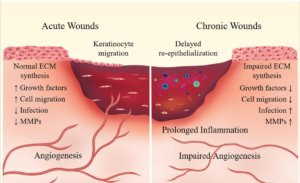 Wounds come in many forms, but they generally fall into two categories: acute and chronic. Understanding the differences between these types of wounds and their healing processes is crucial to effective treatment and recovery. Let’s take a closer look at how acute and chronic wounds differ, and how they are treated.
Wounds come in many forms, but they generally fall into two categories: acute and chronic. Understanding the differences between these types of wounds and their healing processes is crucial to effective treatment and recovery. Let’s take a closer look at how acute and chronic wounds differ, and how they are treated.
Understanding the Stages of Wound Healing
Wound healing typically occurs in three stages:
- Inflammatory Phase: The body’s immune system responds to the injury, resulting in redness and swelling.
- Proliferative Phase: New tissue begins to form, closing the wound.
- Maturation Phase: The wound strengthens as collagen is deposited, eventually leading to scar formation.
While most wounds follow these stages, chronic wounds may get “stuck” in one of these phases, leading to complications.
What is an Acute Wound?
An acute wound occurs suddenly due to an injury, surgery, or trauma. These wounds follow the normal stages of healing and usually heal within a few days to weeks, depending on the severity. Examples include cuts, burns, surgical incisions, and abrasions. Acute wounds are generally easier to treat as long as proper care is given to prevent infection.
What is a Chronic Wound?
A chronic wound is one that fails to heal within the expected time frame, often taking more than three months to close. Conditions such as diabetes, poor circulation, or pressure ulcers can contribute to chronic wounds. These wounds may remain in the inflammatory stage, preventing proper healing and increasing the risk of infection and other complications.
How to Treat an Acute Wound
Treating an acute wound involves cleaning the wound, applying an antibiotic ointment, and using a bandage to protect it from further injury. Keeping the wound clean and covered promotes faster healing. In some cases, if the wound is deep, stitches or surgical intervention may be required.
How to Treat a Chronic Wound
Chronic wounds require specialized care. Treatment often includes advanced wound care techniques, such as debridement (removing dead tissue), special dressings, and in some cases, hyperbaric oxygen therapy. Treating underlying conditions, such as improving circulation or managing diabetes, is also crucial in helping the wound heal.
If you’re dealing with a chronic wound or need expert care for an acute wound, DFW Wound Care Center is here to help. We specialize in treating a wide range of wounds using advanced techniques. Our clinics in Plano, Lewisville, Irving, and DeSoto offer immediate openings for new patients. Contact us today using our online form to schedule an appointment and receive personalized care from our skilled team!
Contact us
Schedule an appointment
with our specialists by contacting us or calling our:
